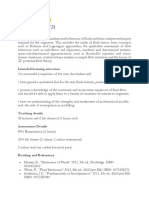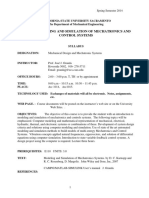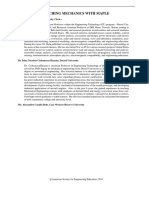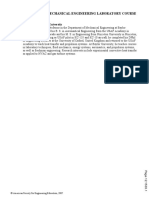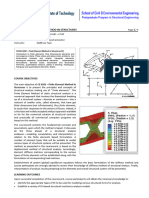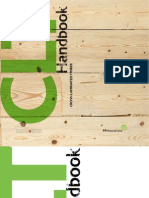University of California, Berkeley Department of Mechanical Engineering E 117: Methods of Engineering Analysis (3 Units)
University of California, Berkeley Department of Mechanical Engineering E 117: Methods of Engineering Analysis (3 Units)
Uploaded by
kakiCopyright:
Available Formats
University of California, Berkeley Department of Mechanical Engineering E 117: Methods of Engineering Analysis (3 Units)
University of California, Berkeley Department of Mechanical Engineering E 117: Methods of Engineering Analysis (3 Units)
Uploaded by
kakiOriginal Title
Copyright
Available Formats
Share this document
Did you find this document useful?
Is this content inappropriate?
Copyright:
Available Formats
University of California, Berkeley Department of Mechanical Engineering E 117: Methods of Engineering Analysis (3 Units)
University of California, Berkeley Department of Mechanical Engineering E 117: Methods of Engineering Analysis (3 Units)
Uploaded by
kakiCopyright:
Available Formats
University Of California, Berkeley
Department of Mechanical Engineering
E 117: Methods of Engineering Analysis (3 units)
Elective Course
Syllabus
CATALOG DESCRIPTION
Methods of theoretical engineering analysis; techniques for analyzing partial differential
equations and the use of special functions related to engineering systems. Sponsoring
Department: Mechanical Engineering.
COURSE PREREQUISITES
Mathematics 53, 54.
TEXTBOOK(S) AND/OR OTHER REQUIRED MATERIAL
Interest in solving engineering problems by mathematical analysis. Knowledge of calculus,
basic linear algebra, vector analysis. Textbook to be assigned by instructor.
COURSE OBJECTIVES
To acquire facility with basic methods of analysis relevant to physics and engineering and to
prepare students for more advanced study. To understand and use tools of linear analysis
needed in quantitative engineering.
DESIRED COURSE OUTCOMES
Ability to apply basic techniques of applied mathematics to problems in engineering and the
physical sciences. Development of familiarity with methods of analysis essential to
quantitative work in engineering.
TOPICS COVERED
Fourier series, various types of differential equations encountered in physical systems (wave,
heat and Laplace equations), separation of variables, solution by Fourier and Laplace
transforms, basic complex variables, introduction to relevant numerical methods.
CLASS/LABORATORY SCHEDULE
Three hours of lecture and one hour of discussion per week.
CONTRIBUTION OF THE COURSE TO MEETING THE PROFESSIONAL
COMPONENT
Equips students with an ability to use the techniques, skills, and modern engineering tools
necessary for engineering practice.
RELATIONSHIP OF THE COURSE TO ABET PROGRAM OUTCOMES
Enables students to apply knowledge of applied mathematics to analyze problems in science
and engineering. An ability to apply knowledge of mathematics, science, and engineering.
An ability to identify, formulate, and solve engineering problems. The broad education
necessary to understand the impact of engineering solutions in a global and societal context.
An ability to use the techniques, skills, and modern engineering tools necessary for
engineering practice.
ASSESSMENT OF STUDENT PROGRESS TOWARD COURSE OBJECTIVES
Grades on assigned homework (including computer projects), midterm and final.
PERSON(S) WHO PREPARED THIS DESCRIPTION: David Steigmann Feb. 26, 2006
You might also like
- Method Statement For A Construction Project PDFDocument114 pagesMethod Statement For A Construction Project PDFSyed Viqar Ahmed90% (10)
- MEng BristolDocument47 pagesMEng BristolvklsNo ratings yet
- FEA 2014-Course NotesDocument164 pagesFEA 2014-Course NotesVitor Folador GonçalvesNo ratings yet
- RCC Encasing Pipe CulvertDocument40 pagesRCC Encasing Pipe CulvertVM&CO VM&CO0% (1)
- Generators - Cummins PDFDocument244 pagesGenerators - Cummins PDFMAGDY KAMEL100% (4)
- University of California, Berkeley Department of Mechanical Engineering ME 106: Fluid Mechanics (3 Units)Document2 pagesUniversity of California, Berkeley Department of Mechanical Engineering ME 106: Fluid Mechanics (3 Units)Rajput Snehi SinghNo ratings yet
- Me C180Document3 pagesMe C180patrickNX9420No ratings yet
- Maths1year CommonDocument6 pagesMaths1year CommonKrishna yadavNo ratings yet
- Sec71 60Document25 pagesSec71 60YoussoufAdelekeNo ratings yet
- 2 EesyllDocument77 pages2 EesyllDileepNo ratings yet
- ASEE 2012 Watson Draft 2Document22 pagesASEE 2012 Watson Draft 2Anonymous ncBe0B9bNo ratings yet
- Syllabus Me 372Document3 pagesSyllabus Me 372zembimNo ratings yet
- MECH 315 Course Outline F2013Document7 pagesMECH 315 Course Outline F2013animaniax666No ratings yet
- Mathematics 1 Autonomous SylDocument1 pageMathematics 1 Autonomous Sylravi167784No ratings yet
- Me Machine DesignDocument86 pagesMe Machine DesignManjunath NadarajanNo ratings yet
- Course DescriptionDocument12 pagesCourse DescriptionEKS SANTIAGONo ratings yet
- BEE301Document4 pagesBEE301cshohil300No ratings yet
- MTH 2313 (Complex and Numerical) Revised Course Outlines-Dr SazzadDocument5 pagesMTH 2313 (Complex and Numerical) Revised Course Outlines-Dr SazzadAhmad NorfirdausNo ratings yet
- 2ecesyll 1 5Document5 pages2ecesyll 1 5Karthik SNo ratings yet
- 3-8th Semester ECE VTU SyllabusDocument100 pages3-8th Semester ECE VTU SyllabusSumukh UmeshNo ratings yet
- 3rd Sem SyllabusDocument25 pages3rd Sem SyllabusPoornima.M.R KashyapNo ratings yet
- Engineering Physics I Syllabus Course IdentificationDocument5 pagesEngineering Physics I Syllabus Course IdentificationSteve TorresNo ratings yet
- Applied and Computational Mathematics - Princeton UniversityDocument8 pagesApplied and Computational Mathematics - Princeton Universityharvey100% (1)
- Me 151Document2 pagesMe 151Mohammad Mustafa AkbariNo ratings yet
- Course Description - Computer EngineeringDocument14 pagesCourse Description - Computer EngineeringJeff LaycoNo ratings yet
- Course Description - Computer EngineeringDocument14 pagesCourse Description - Computer EngineeringJeff LaycoNo ratings yet
- Probability Course OutlineDocument2 pagesProbability Course OutlineMitikuNo ratings yet
- 2 ActsyllDocument100 pages2 ActsyllbhaskarbrvNo ratings yet
- Syllabus 2023Document2 pagesSyllabus 2023Morteza NikoonejadNo ratings yet
- ELGA For CEET311 SyllabusDocument7 pagesELGA For CEET311 SyllabusJoshua HernandezNo ratings yet
- 600026_G60_2024-25_enDocument9 pages600026_G60_2024-25_enelhuevos15aNo ratings yet
- Numerical Methods 1 Semester SyllabusDocument2 pagesNumerical Methods 1 Semester SyllabusMichael Dave LasconiaNo ratings yet
- M E 344 MoonDocument6 pagesM E 344 Moonbakisahin2No ratings yet
- ME 171 SyllabusDocument7 pagesME 171 SyllabusLucas Penalva Costa SerraNo ratings yet
- Teaching Mechanics With MapleDocument21 pagesTeaching Mechanics With MapleBlueOneGaussNo ratings yet
- SyllabusDocument3 pagesSyllabusrsyed2704No ratings yet
- 2 EnccsyllDocument90 pages2 EnccsyllMegha ShreeNo ratings yet
- BE I Syllabus (2) - MergedDocument33 pagesBE I Syllabus (2) - Mergednikita.choudhary1808No ratings yet
- ME 130 Applied Engineering Analysis Class: Welcome ToDocument14 pagesME 130 Applied Engineering Analysis Class: Welcome ToNidaa Al AlousiNo ratings yet
- Computer Packages For Chemical EgineersDocument4 pagesComputer Packages For Chemical EgineersConner4realNo ratings yet
- Course Syllabus - Mechanics of MaterialsDocument6 pagesCourse Syllabus - Mechanics of MaterialsAlan Mauricio InsaustiNo ratings yet
- Bmat201 PDFDocument5 pagesBmat201 PDFThaanya sNo ratings yet
- Math 3Document3 pagesMath 3scribNo ratings yet
- Advanced Engineering Mathemathics PDFDocument3 pagesAdvanced Engineering Mathemathics PDFRia Galang100% (1)
- Advanced Engineering MathemathicsDocument3 pagesAdvanced Engineering MathemathicsMarvin Bryant MedinaNo ratings yet
- Using A Mechanical Engineering Laboratory Course For AssessmentDocument18 pagesUsing A Mechanical Engineering Laboratory Course For Assessmentray malonjaoNo ratings yet
- 22MATM11Document6 pages22MATM11rakshaNo ratings yet
- INEL4103Document3 pagesINEL4103EricDeLeonNo ratings yet
- L204 MA143 Mathematics IVDocument2 pagesL204 MA143 Mathematics IVBrayhan Anthony Rojas QuispeNo ratings yet
- Course Outline MEIE-4182 Fall-2011Document4 pagesCourse Outline MEIE-4182 Fall-2011عبدالعزيز مسلمNo ratings yet
- ALL NEW (Math) (Dr.Muh قوى)Document184 pagesALL NEW (Math) (Dr.Muh قوى)ashrafgerges719No ratings yet
- MATH1310 EngMath1 Sem1!15!16Document7 pagesMATH1310 EngMath1 Sem1!15!16Azrin SaediNo ratings yet
- 2 EcesyllDocument91 pages2 Ecesyllchavanakshay1812No ratings yet
- Zhu 2020 Embedding Active Learning and Design Based Projects in A NVH CourseDocument11 pagesZhu 2020 Embedding Active Learning and Design Based Projects in A NVH CoursesantoshbillurNo ratings yet
- EAS 207 - ABET - Spring - 20130123Document6 pagesEAS 207 - ABET - Spring - 20130123SyedZain1993No ratings yet
- CE6502 Finite Element Method in Structures - Course Outline 2019.20 IIDocument4 pagesCE6502 Finite Element Method in Structures - Course Outline 2019.20 IIyoseph asayeNo ratings yet
- Maths Course Outlines (New)Document15 pagesMaths Course Outlines (New)dtbjackleNo ratings yet
- Scheme & Syllabus III & IV Semester B.E Computer Science and Engineering (2012 Scheme)Document46 pagesScheme & Syllabus III & IV Semester B.E Computer Science and Engineering (2012 Scheme)Lalit KumarNo ratings yet
- 2 EtsyllDocument99 pages2 Etsyllshreyasgrade9No ratings yet
- Syllabus F13Document1 pageSyllabus F13nick10686No ratings yet
- Complex Variables for Scientists and Engineers: Second EditionFrom EverandComplex Variables for Scientists and Engineers: Second EditionRating: 5 out of 5 stars5/5 (1)
- Catalog PDFDocument518 pagesCatalog PDFkakiNo ratings yet
- Me 185 F18Document2 pagesMe 185 F18kakiNo ratings yet
- E117 PDFDocument2 pagesE117 PDFkakiNo ratings yet
- Me40 PDFDocument2 pagesMe40 PDFkakiNo ratings yet
- E26 Three Dimensional Modeling For Design Spring 2018Document4 pagesE26 Three Dimensional Modeling For Design Spring 2018kakiNo ratings yet
- ME40 Syllab S 18 PDFDocument1 pageME40 Syllab S 18 PDFkakiNo ratings yet
- E26 Three Dimensional Modeling For Design Fall 2018Document3 pagesE26 Three Dimensional Modeling For Design Fall 2018kakiNo ratings yet
- ME40 F2018 Syllabus PDFDocument4 pagesME40 F2018 Syllabus PDFkakiNo ratings yet
- Me108 PDFDocument1 pageMe108 PDFkakiNo ratings yet
- University of California, Berkeley Department of Mechanical Engineering Engineering 26: Three-Dimensional Modeling For Design (2 Units)Document3 pagesUniversity of California, Berkeley Department of Mechanical Engineering Engineering 26: Three-Dimensional Modeling For Design (2 Units)kakiNo ratings yet
- ME 40 Thermodynamics PDFDocument3 pagesME 40 Thermodynamics PDFkakiNo ratings yet
- E117 PDFDocument2 pagesE117 PDFkakiNo ratings yet
- TM 5-809-10Document450 pagesTM 5-809-10Armando Farías100% (2)
- 2020055.MSM Eee312l Lab 03Document8 pages2020055.MSM Eee312l Lab 03Mahmud SazzadNo ratings yet
- ELEC71070 WCN CWK 1 sm2 2022-23 v1 FINALDocument8 pagesELEC71070 WCN CWK 1 sm2 2022-23 v1 FINALkashan asifNo ratings yet
- Project Planning & Control Assignment 1 - Week 1: SolutionsDocument3 pagesProject Planning & Control Assignment 1 - Week 1: SolutionskkarukkuvelanNo ratings yet
- Checklist For Onsite Supervision For Screeding Tips 1 - 3 - The Screed Scientist®Document3 pagesChecklist For Onsite Supervision For Screeding Tips 1 - 3 - The Screed Scientist®waleed060No ratings yet
- Diff. ExpansionDocument4 pagesDiff. ExpansionSandeep Kumar Acharya100% (3)
- ENGG 406 Engineering Management PDFDocument431 pagesENGG 406 Engineering Management PDFDesi Margaret Elauria100% (1)
- Water Safety, Security and Sustainability: Ashok Vaseashta Carmen Maftei EditorsDocument731 pagesWater Safety, Security and Sustainability: Ashok Vaseashta Carmen Maftei EditorsJose LozanoNo ratings yet
- Saic M 1008Document1 pageSaic M 1008Hussain Nasser Al- NowiesserNo ratings yet
- Civil Engineering Term Paper TopicsDocument7 pagesCivil Engineering Term Paper Topicsafmzvjvjzoeqtg100% (1)
- Restaurant Interior Fitout Services in DubaiDocument8 pagesRestaurant Interior Fitout Services in DubaiCapstone Interior Design LLCNo ratings yet
- Jayson Engao AngelesDocument3 pagesJayson Engao AngelesDaryll SanjoseNo ratings yet
- SD SeriesDocument8 pagesSD SeriesUrsula JohnsonNo ratings yet
- BE MinMax Inst Course R2Document34 pagesBE MinMax Inst Course R219IT088 CHARMI PRAVINBHAI PATELNo ratings yet
- Overvew Column AnalysisDocument40 pagesOvervew Column AnalysisFadli Kurnia100% (3)
- Soil MechanicsDocument2 pagesSoil MechanicsNeil Edward Sison50% (2)
- Elestomeric BearingsDocument152 pagesElestomeric BearingsvaibhavNo ratings yet
- RCD Project (Acknowledgment and Definition of Terms)Document4 pagesRCD Project (Acknowledgment and Definition of Terms)alyssa babylaiNo ratings yet
- Quantity SurveyingDocument6 pagesQuantity SurveyingVinee Tinee100% (1)
- Second Semester-NOTESDocument183 pagesSecond Semester-NOTESkalpanaNo ratings yet
- CLT Handbook (2012)Document594 pagesCLT Handbook (2012)panchorod100% (11)
- Vacancies List V2 PDF 2Document68 pagesVacancies List V2 PDF 2Yusri JumatNo ratings yet
- Risk and Uncertainty ManagementDocument12 pagesRisk and Uncertainty ManagementSamuel DambaniNo ratings yet
- Unit - 10 - Scope of Civil EnggDocument10 pagesUnit - 10 - Scope of Civil EnggPinalNo ratings yet
- Syllabus For Electrical Electronic and Communication EngineeringDocument107 pagesSyllabus For Electrical Electronic and Communication EngineeringJack JonesNo ratings yet
- CADMATIC Marine Electrical: Unlock Next Level Efficiency by Connecting Electrical Design To 3D ModelingDocument7 pagesCADMATIC Marine Electrical: Unlock Next Level Efficiency by Connecting Electrical Design To 3D ModelingPCNo ratings yet


